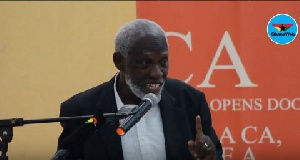Dean of Faculty of Arts and Sciences at the Ashesi University College, Prof. Stephen Adei, has expressed grave disappointment in the output of teaching and learning in public basic schools, saying public school teachers ‘wickedly’ refuse to teach their pupils hence the appalling results manifesting in bad Basic Education Certificate Examination (BECE) results.
He said the worth of the nation’s social capital in reference to the quality of pre-university education, especially basic education, is nothing to write home about, a situation he suggested had reached ‘crisis proportion’.
The Former Rector of the Ghana Institute of Management and Public Administration (GIMPA), expressed worry at the alarming number of children at the basic level who were receiving little or no education and suggested teachers handling children in all public basic schools be relieved of their duties.
Based on his claim, Prof. Adei predicted a likely 50 percent decrease in the percentage of students who proceed into the tertiary level after completing their secondary education stating that, the Free SHS policy should not be blamed when the reduction occurs.
“…..even before free education, 30 percent of secondary school people qualified to go further and if we are not careful, in 3 years’ time, it will reduce to 15 percent because of the numbers going there and the blame will be on Free SHS. No, it is not Free SHS because the teachers in the basic school wickedly, and I am using my words well, wickedly have refused to teach our children.
We have a situation which is in crisis proportion whereby most of the children which are 80 percent of them, the public basic education are having no education at all and if it continues, free education will be a matter of just postponing the age in which their total illiteracy will become evident,” he mentioned.
He compared private basic school teachers to public basic school teachers saying the private basic school teachers, even though not trained teachers are able to adequately equip children in terms of education much better than teachers in the public sector do and called out public basic school teachers who took their children to private schools for better and quality education.
“Most of them take their children to private schools where the teachers have never gone to any training college, they are secondary school failures and yet they deliver better quality education than our trained teachers, he mentioned.
‘That is why I believe that today if you sack all the public teachers in the basic school, there will not be a deterioration in education and if anybody dares it they should challenge me and I will show that secondary school failures can do a better job than them, because they are not teaching and after three years, with the lowest qualifications in secondary school, they go to training colleagues and when they finish they are paid more than graduate secondary school teachers,” Prof. Adei noted.
Prof. Adei reportedly made a similar statement early last year when he called on government to lay off trained teachers in public schools saying they were not giving their all.
“I believe that if the government is able to take this difficult and radical decision, it will go a long way to better the lot of Ghanaian children at the basic level,” he reportedly said.
He advised that the public education sector be properly managed with high standards of discipline enforced amongst teachers to gradually eliminate the nonchalant attitude most of these teachers have towards teaching children in the public schools.
The Ashesi University lecturer was speaking after a presentation on the theme Ghana Beyond Aid: how can we get there? Organised by the Institute of Chartered Accountants at the College of Physicians and Surgeons in Accra.
General News of Thursday, 22 March 2018
Source: www.ghanaweb.com













